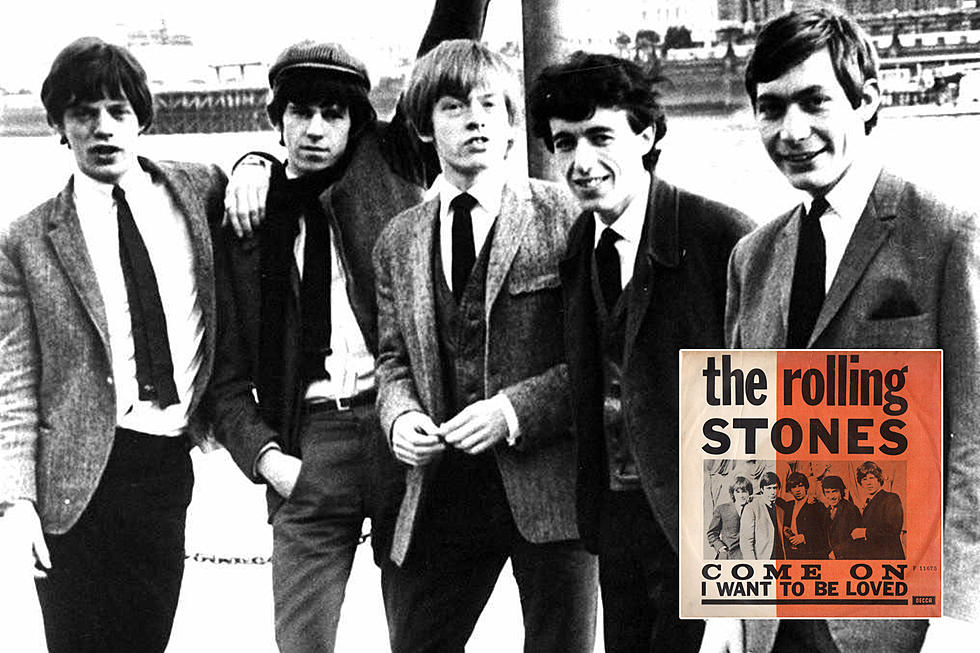
60 Years Ago: The Rolling Stones Release Their First Single
The Rolling Stones' first single was both auspicious and inauspicious in one fell swoop.
On one hand, the version of Chuck Berry's "Come On" released on June 7, 1963 — about 19 months after the original — was the first step in a recording career that's lasted more than six decades. It also gave the burgeoning Stones their first appearance on the U.K. charts.
On the other hand, it was a cover, somebody else's song and not something from the Mick Jagger-Keith Richards songwriting axis that would surface 11 months later.
It's not that Jagger and Richards weren't trying to write songs; they just weren't very good or in manager-producer Andrew Loog Oldham's words, "soppy and imitative." "We weren't naturals at the beginning," Richards told this writer in 1986. "It took us a long time to get it right. We were coming up with these ballads, and they kept getting the thumbs-down. It wasn't the kind of music the band wanted to be doing. So we kept banging away at it." It reached a point where Oldham famously locked Jagger and Richards in a room with orders to "come out with a song." The result was "As Tears Go By," which was first recorded by Marianne Faithfull, while a subsequent effort, "Tell Me" landed on the Rolling Stones' debut album in April 1964, reaching No. 24 on the Billboard Hot 100. "The Last Time" in early 1965 would be the Stones' first A-side single in the U.K., hitting No. 10 on the chart, as well as No. 9 in the U.S.
It's fair to say Jagger and Richards got the picture in short order. By 1966's Aftermath, the duo was penning an LP's worth of tunes by themselves, and in 1993 the partnership was awarded a spot in the Songwriters Hall of Fame.
A Chuck Berry song made a great deal of sense for the Stones' first recording, however, as he was an artist over which Jagger and Richards bonded when they first met on Oct. 17, 1961, at a railway station in their native Dartford. "I was keen on Chuck Berry, and I thought I was the only fan for miles," Richards wrote in a letter to his aunt that was included in his autobiography, Life. "But one mornin' on Dartford Stn, I was holding one of Chuck's records when a guy I knew at primary school ... came up to me. He's got every record Chuck Berry ever made and all his mates have, too, they are all rhythm and blues fans, real R&B I mean (not this Dinah Shore, Brook Benton crap) Jimmy Reed, Muddy Waters, Chuck, Howlin' Wolf, John Lee Hooker - all the Chicago bluesmen real lowdown stuff, marvelous."
Listen to the Rolling Stones' 'Come On'
The Stones, who had already done some recording at London's IBC Studios earlier in the year, signed with Decca Records in April 1963 and hit Olympic Sound Studios on May 10, 1963, for the first sessions. "Come On" was the last single Berry released, in October 1961, before being imprisoned for transporting an underage minor across state lines and did not chart in the wake of the controversy. It also wasn't among the many Berry covers the Stones were playing in their set at the time, but the group came up with a decidedly pop-flavored rendition that weighed in at a brisk minute and 48 seconds, with Brian Jones and Bill Wyman adding backing vocals and Jones providing a few harmonica honks. Jagger referred to it as "a bunch of bloody amateurs going to make a hit single"; the Stones tapped another one of their heroes, Muddy Waters, for a B-side rendition of his "I Want to Be Loved."
"I didn't think it was the best thing we could have done, but I did know it was something that would make a mark," Richards wrote in Life. "As a recording, it's probably better than I thought it was at the time. But I have a feeling we thought that was the only shot we had in our locker then. ... It's very different from Chuck Berry's version; it's very Beatle-ized, in fact." Oldham, a novice at producing at the time, left mixing chores to engineer Roger Savage. Decca was only lightly committed to promoting the record, taking out just one ad, but Oldham had Stones fan club members buy copies at record shops that reported to U.K.'s Official Charts Company to help it climb to No. 21.
That profile allowed the Stones to play in larger venues in the U.K. as well as to appear on TV. The band made its small screen debut on July 7, lip-syncing to a recording of "Come On" for the Lucky Stars Summer Spin in Birmingham. On Aug. 23 the Stones did the same for the influential Ready Steady Go! in London, which led to a long association with the show's producer, Michael Lindsay-Hogg, who'd go on to direct videos as well as The Rolling Stones Rock and Roll Circus in 1968. "Come On" was out of the Stones' live repertoire by 1965, but Jagger sang a bit of it during the Toronto stop of the 50 & Counting Tour on June 6, 2013, noting that single's 50th anniversary.
Jagger has long been dismissive of "Come On," but during a 1968 interview with Rolling Stone, he was buoyed by the idea that by recording it the Stones had introduced the tune, and in some cases Berry, to a new audience: "They never knew anything about it. ... So you could say that we did blues to turn people on, but why they should be turned on by us is unbelievably stupid. I mean, what's the point in listening to us doing 'I'm a King Bee' when you can listen to Slim Harpo doing it?"
For their next single the Stones would get help from some British music brethren: The Beatles' John Lennon and Paul McCartney wrote "I Wanna Be Your Man," which came out five months after "Come On" and climbed to No. 12 on the U.K. chart.



